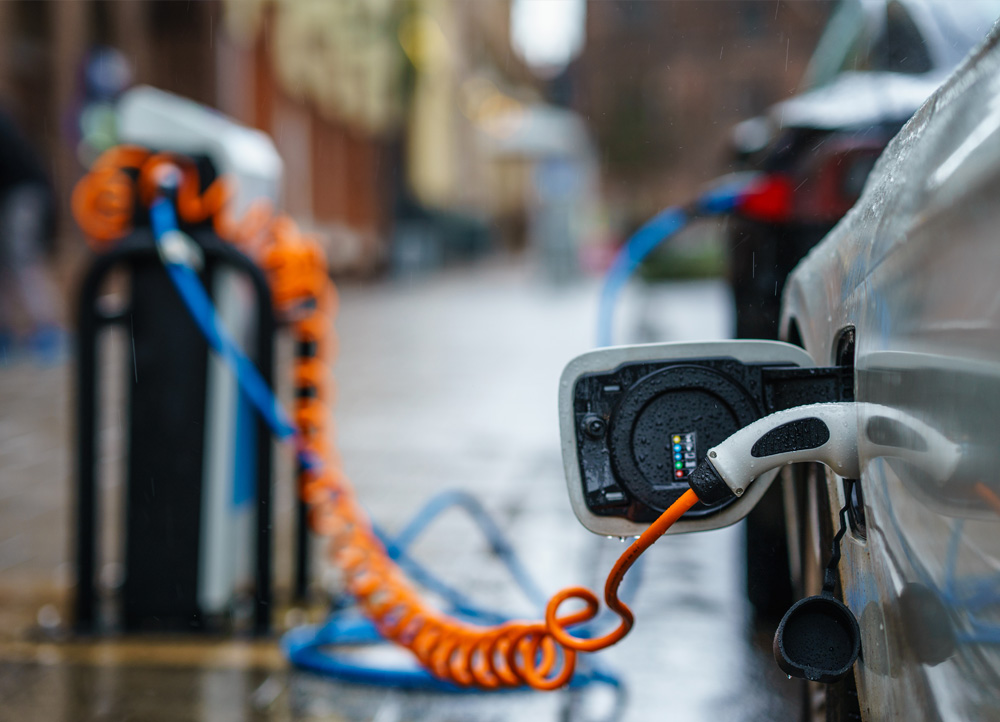S h a r e
UK best placed in Europe to go electric


Posted by
Kevin Blackmore
April 2021
The UK is best placed to switch its cars and vans from petrol and diesel to electric vehicles (EVs), according to new research which looked at nine different countries.
In a new study by telematics provider Webfleet Solutions, data from around 100,000 connected vehicles, operated by more than 5,000 fleets across Europe, was analysed to see which were most suitable to make the transition to EVs.
The research showed that more than two thirds (70%) of cars and light commercial vehicles currently being operated in the UK could be replaced by electric models, compared to a European average of 61%.
The analysis centred around which internal combustion engine vehicles could be replaced with electric alternatives, based on daily driven distances.
The research assumed that, if a vehicle drove less than 300km (186 miles) per day over a 12-month period, it could be replaced with an EV.
The 300km (186 miles) maximum daily driving distance was chosen to reflect the average range of the most common, available electric cars and LCVs.
The analysis showed that the UK was ahead of its European counterparts when it came to the potential for the transition to EVs.
In all countries examined, at least half of all business cars and LCVs could be replaced by EVs, with the UK reporting the highest electrification potential.
It came out top, with the suggested result that 70% of business cars and LCVs could be electrified, followed by the Netherlands (69%), France (67%) and Germany (61%).
These countries also had the highest availability of charging points which was a key factor in transitioning to EVs. There are some 144,000 charging points available across the EU and UK today, with the majority in the Netherlands (26%), Germany (19%), France (17%) and the UK (13%).
Cities enact restrictions to cut emissions
Many major European cities have also enacted severe restrictions to cut carbon emissions. London, for example, aims to be emissions-free by 2040 for all vehicles.
Alongside these urban restrictions, the study also considered incentives such as significant tax cuts and purchasing grants available to buyers of EVs for both private and business use.
The research looked at a number of business areas, including technical installation and repairs, passenger transport, food and beverage and professional services, such as service and maintenance, repair services and field services.
The data was analysed from connected vehicles across Europe in the following countries: Austria, Belgium, France, Germany, UK, Italy, the Netherlands, Spain and Poland.
Fleet Alliance managing director Martin Brown commented: “The research was quite clear in that the trips being taken by the vast majority of business cars and LCVs in the sectors analysed could be made by electric vehicles.
“This is very much in line with our own commitment to move to electric power by 2030 and to encourage our customers to do likewise. The barriers to entry are coming down all the time.
“We have seen how the manufacturers have been able to cut on-the-road prices for many of their electric car ranges to keep them within the new £35,000 Plug-in Car Grant (PICG) eligibility threshold
“We believe that we will continue to see front end price reductions as competition increases and more electric models come onto the market. And we are continuing to see investment in charging infrastructure which is perhaps the largest single barrier to EV adoption.
“But we remain confident that, with the levels of Government and private investment that we are currently seeing, that this hurdle, too, will be overcome and that the transition to EVs will become more suitable and straightforward for all,” he said.
You also might like…
If you liked this article then check out our posts about similar topics
New visual branding for eFleet as Global Vehicle Group embraces platform
Fleet Alliance has announced that its end-to-end fleet management platform, e-Fleet, will be adopted across the Global V...
How the Global acquisition enhances Fleet Alliance’s AR proposition
At the beginning of June, Fleet Alliance became part of the Global Vehicle Group, thereby creating the largest B2B leasi...
Eurocell adds huge van order to fleet following advice from Fleet Alliance
Eurocell, the UK's leading upvc window, door and conservatory manufacturer and distributor, has replaced a large proport...
Fleet Alliance archives Intelligent Car Leasing brand to focus on core fleet business
Fleet Alliance has discontinued its Intelligent Car Leasing brand, which specialised in consumer leasing The Glasgow ...
JG Pest Control updates fleet with new Peugeot Partners from Fleet Alliance
JG Pest Control, one of the country’s leading pest control operators, has updated its fleet thanks to a new batch of P...
Warp Snacks opts for EV salary sacrifice scheme with Fleet Alliance
Healthy snacks manufacturer Warp Snacks, has introduced an electric car salary sacrifice scheme for staff in conjunction...
Chancellor cuts National Insurance, extends fuel duty freeze and fully expenses leased assets
In the last Budget before the General Election, Chancellor Jeremy Hunt unveiled a series of headline-grabbing initiative...
2024 will be the year of the EV with greater supply and lower prices, says Fleet Alliance
2024 will be the year that companies look to accelerate down the electrification route, as they seek to meet their own E...
Ready to make the management of your fleet more efficient?
Request a call back
